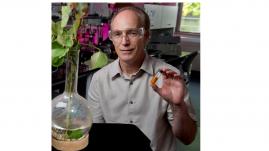
G. Charles Dismukes joined Rutgers University in 2009 as Distinguished Professor in the Department of Chemistry & Chemical Biology and principal investigator of the Waksman Institute of Microbiology. His research focuses on heterogeneous and homogeneous catalysis for producing chemicals and fuels using renewable sources of energy. His published works describe the synthesis, characterization and fundamental physico-chemical principles of operation of both natural and artificial photosynthetic systems, electrocatalysts and photocatalysts. His approach aims to incorporate chemical insight gained from the evolution of biological catalysts to design abiotic catalysts that leapfrog past conventional screening methods to achieve unprecedented performance and durability. His research at Rutgers has led to the development of electrocatalysts made from non-precious materials that can split water into its elements, both OER and HER catalysts, and others for the selective reduction of CO2 to complex carbohydrates C1 to C5 and polymers. Some of these catalysts are finding their way into solar cells, electrolyzers and sustainable processes for producing chemicals from CO2 and water using electricity.
He received a BS in chemistry from the Lowell Technological Institute, Lowell, MA; PhD in radiation physical chemistry from the University of Wisconsin, Madison, WI (Mentor: John Willard), and did postdoctoral work in laser and magnetic resonance spectroscopies applied to photosynthetic and chemical systems in the Calvin Laboratory at the University of California, Berkeley, CA (Mentors: Ken Sauer & Melvin Klein).
His honors include: 2019 Visiting Professor University of Colorado, Boulder CO; Chem & Biol Eng; 2019 Visiting scientist National Renewable Energy Laboratory, Golden, CO; 2019 NASA CO2 Challenge Prize co-winner phase 1; 2011 ConocoPhillips Energy Prize Finalist; 2010 Excellence in Catalysis Award from the Catalysis Society of Metropolitan New York; and 2009-Senior Chemist by appointment, Princeton University.
